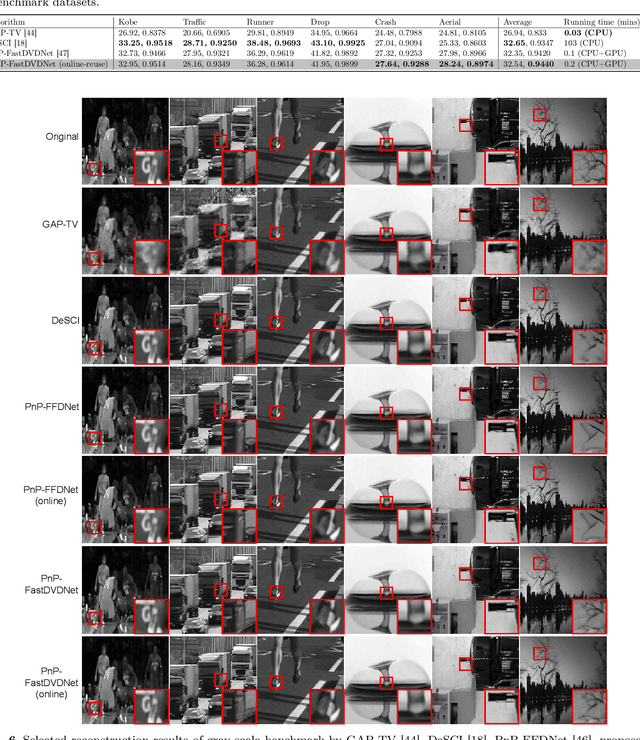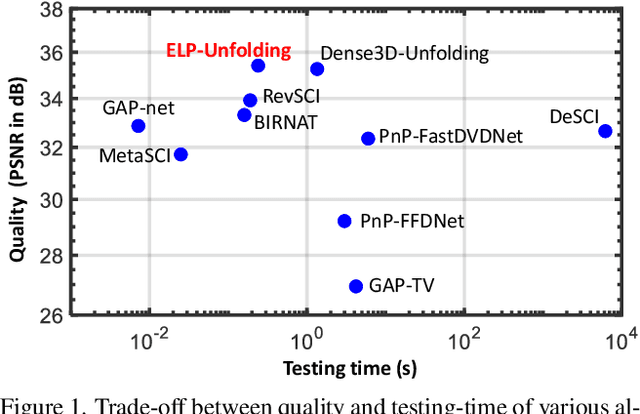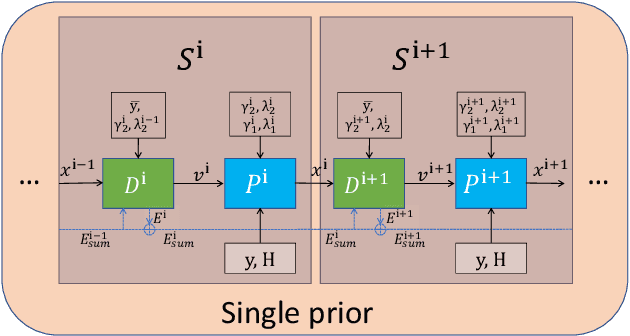Chengshuai Yang
Adaptive Deep PnP Algorithm for Video Snapshot Compressive Imaging
Jan 28, 2022



Abstract:Video Snapshot compressive imaging (SCI) is a promising technique to capture high-speed videos, which transforms the imaging speed from the detector to mask modulating and only needs a single measurement to capture multiple frames. The algorithm to reconstruct high-speed frames from the measurement plays a vital role in SCI. In this paper, we consider the promising reconstruction algorithm framework, namely plug-and-play (PnP), which is flexible to the encoding process comparing with other deep learning networks. One drawback of existing PnP algorithms is that they use a pre-trained denoising network as a plugged prior while the training data of the network might be different from the task in real applications. Towards this end, in this work, we propose the online PnP algorithm which can adaptively update the network's parameters within the PnP iteration; this makes the denoising network more applicable to the desired data in the SCI reconstruction. Furthermore, for color video imaging, RGB frames need to be recovered from Bayer pattern or named demosaicing in the camera pipeline. To address this challenge, we design a two-stage reconstruction framework to optimize these two coupled ill-posed problems and introduce a deep demosaicing prior specifically for video demosaicing which does not have much past works instead of using single image demosaicing networks. Extensive results on both simulation and real datasets verify the superiority of our adaptive deep PnP algorithm.
Ensemble learning priors unfolding for scalable Snapshot Compressive Sensing
Jan 25, 2022



Abstract:Snapshot compressive imaging (SCI) can record the 3D information by a 2D measurement and from this 2D measurement to reconstruct the original 3D information by reconstruction algorithm. As we can see, the reconstruction algorithm plays a vital role in SCI. Recently, deep learning algorithm show its outstanding ability, outperforming the traditional algorithm. Therefore, to improve deep learning algorithm reconstruction accuracy is an inevitable topic for SCI. Besides, deep learning algorithms are usually limited by scalability, and a well trained model in general can not be applied to new systems if lacking the new training process. To address these problems, we develop the ensemble learning priors to further improve the reconstruction accuracy and propose the scalable learning to empower deep learning the scalability just like the traditional algorithm. What's more, our algorithm has achieved the state-of-the-art results, outperforming existing algorithms. Extensive results on both simulation and real datasets demonstrate the superiority of our proposed algorithm. The code and models will be released to the public.
 Add to Chrome
Add to Chrome Add to Firefox
Add to Firefox Add to Edge
Add to Edge